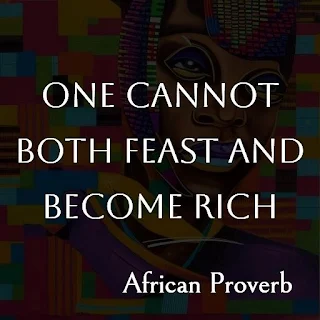Meaning of One Cannot Both Feast and Become Rich
One cannot both feast and become rich is an African proverb about sacrificing short-term pleasures and focus on long-term goals.
One cannot both feast and become rich is an African proverb about the fact that one cannot enjoy immediate gratification and achieve long-term financial security at the same time. In other words, if you want to accumulate wealth and achieve financial independence, you must sacrifice short-term pleasures and focus on long-term goals.
The proverb highlights the importance of discipline and self-control in achieving financial success. In order to become wealthy, one must be willing to forego immediate gratification in favor of long-term financial goals. This means being disciplined enough to save money, invest wisely, and avoid frivolous spending.
One cannot both feast and become rich points out that a focus on immediate gratification can actually hinder one's long-term financial prospects. If you spend all your money on luxuries and extravagances, you will have little left over to invest in your future or to weather financial emergencies.
Also, the African proverb highlights the importance of delayed gratification in achieving long-term financial security. In order to accumulate wealth, one must be willing to make sacrifices in the present, such as reducing expenses or working extra hours, in order to achieve a better financial future.
The proverb emphasizes the importance of investing in oneself and one's future. This may mean investing in education, career development, or other areas that will increase one's earning potential and financial stability over the long term. The pursuit of wealth is not an easy or simple task. It requires hard work, discipline, sacrifice, and a willingness to forego immediate pleasures in favor of long-term financial goals.
One cannot both feast and become rich highlights the need for balance in one's financial life. While it is important to save and invest for the future, it is also important to enjoy life and take pleasure in the present moment. The pursuit of wealth is not just about accumulating money, but also about building financial independence and security. This may involve developing multiple sources of income, creating a financial safety net, and investing in assets that will appreciate in value over time.
The African proverb highlights the importance of avoiding debt and living within one's means. In order to achieve long-term financial stability, one must avoid debt traps and make sure that expenses do not exceed income.
Finally, the proverb emphasizes the importance of a long-term perspective in financial planning. Wealth accumulation is a marathon, not a sprint, and requires consistent effort and discipline over time. By focusing on long-term goals and avoiding short-term temptations, one can achieve financial independence and security.
More links to articles you will find thought provoking.










